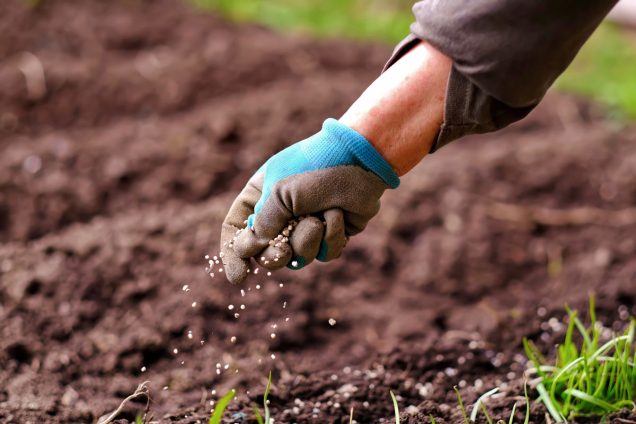As spring ripens and summer looms on the horizon, it’s not only the season for beach getaways and family road trips. Many of us, of course, are also busy at work with lawn and garden care and, in some cases, the never-ending management of farmland.
This is the time of year when lots of fertilizers and chemicals are being applied to turf, flower beds, and crops. In addition to representing a potential source of pollution in surface water bodies, improperly done applications of these substances can also threaten groundwater – and, therefore, private wells.
If you own a well in Connecticut, it’s important to be aware of how you use and store fertilizers, herbicides, and pesticides – and the nature of their usage in your vicinity.
At Greco & Haines, we can help you assess and address any concerns about well water contamination from fertilizers and chemicals via the water testing we offer throughout Connecticut.
Fertilizer Contamination of Groundwater
Fertilizers are used to supply essential nutrients – namely nitrogen, phosphorus, potassium, and other secondary elements – needed for plant growth and maintenance.
Excess fertilizer application, beyond what plants can uptake through their roots, and ill-timed application can input nutrients into surface and groundwater systems. This helps when plants may not be actively absorbing nutrients, or heavy rains can rapidly transport nutrients away from the application site and increase rates of deep infiltration.
Nitrogen is one of the leading causes of concern, given how easily it can be transported by water in the form of nitrate. Soil water can easily leach nitrates down below the root zone of plants, potentially into groundwater reserves.
Nitrates can cause problems when contaminating drinking water. Among the significant issues is methemoglobinemia, or “blue-baby syndrome,” which is most serious for infants. Methemoglobinemia reduces the amount of oxygen that blood can transport throughout the body.
Herbicides, pesticides, other chemical treatments, and organic soil amendments can also be sources of contamination of groundwater and private wells.
Protect Groundwater From Fertilizer
Fortunately, there are many ways to minimize the likelihood of fertilizer nutrients and chemical contaminants associated with lawn or garden care.
Soil Testing
First off, you should consider exactly what kind of fertilizer and amendments your lawn or garden may need – if any at all. Conduct a soil test to understand better a site’s nutrient profile, pH, and other fundamental characteristics, and devise an approach accordingly.
This will help you avoid applying nutrients that aren’t needed. And many lawn and garden setups may do just fine without fertilizer.
Alternatives
You have multiple alternatives to fertilizers. Keeping or spreading grass clippings on your lawn – which provide a source of slow-release nitrogen – and maintaining a higher height of mowing can significantly reduce the lawn’s fertilizer needs.
You can also add nitrogen-fixing legume herbs, such as white clover, to provide a natural nutrient source for your lawn. When establishing a new lawn, consider grasses that naturally require less nitrogen, such as fescues.
When it comes to pesticides and herbicides, consider all the factors that can perpetuate insect pests and weeds. A healthy and well-established lawn and a diverse gardenscape are often quite resilient to major problems in these departments. Soil testing, scrutiny of your watering regime, and plant proximity and density considerations may identify non-chemical solutions to reduce pest populations or plants’ vulnerability to infestation.
Tips for Applying
Needless to say (hopefully), fertilizing by a well is a bad idea. If you are applying fertilizer or chemicals to your property, do so well away from the site of your well (not to mention bodies of surface water and any pavement). Employ a drop spreader to make your applications more precise and targeted.
It’s essential to follow the instructions on fertilizer and chemical labels and generally be reasonable and conservative when applying. The University of Connecticut advises applying nitrogen fertilizer at a maximum rate of half the bag recommendation.
Only use a garden hose to apply chemicals if it has an anti-siphon component to avoid the chance of contaminated water back-flowing into your well.
Keep the timing of fertilizer applications in mind as well. Don’t apply it before green-up in the spring, and when heavy rains are forecast.
Fertilizer & Chemical Storage
It’s also imperative that you store fertilizers and lawn chemicals someplace distant from your wellhead and in proper storage vessels. Dispose of unwanted chemicals at a hazardous-waste collection site.
Well Water Testing to Monitor For Chemical/Fertilizer Contamination of Groundwater
Regular testing of your well water helps you ensure that your lawn and garden care – or that of your neighbors – isn’t contaminating your drinking water supply.
Here at Greco & Haines, water-quality testing for contaminants and basic chemical and mineralogical profiles is among the many well-system services we offer to well owners across Connecticut.
If you’re concerned about the potential of fertilizer or chemical contamination of your well water supply, get in touch with the Greco & Haines team! We’re available seven days a week and 365 days a year, offering the very same rate for holiday and weekend calls as normal business days.
For more information about fertilizers and how they affect well water, reach out to us today or call us at 203-735-9308, 203-777-2256, or call toll-free from any area code at 1-800-922-2958.

